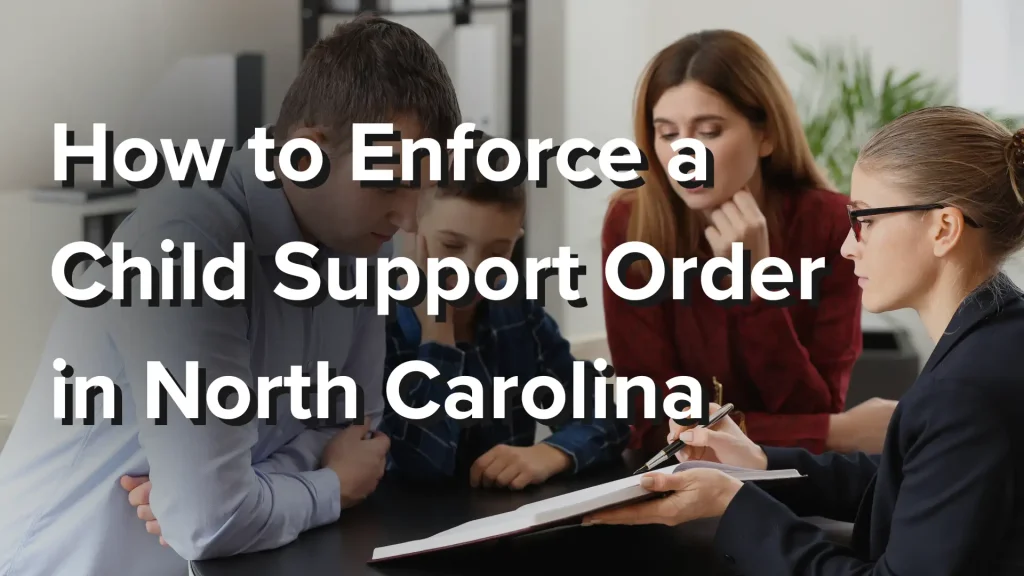
When child support stops, everything gets harder. You still have to cover rent, groceries, medical bills, and school costs—only now, you’re doing it without the money the court ordered. If the other parent falls behind, a child support lawyer in Raleigh can help you enforce child support and take the necessary legal steps to protect your child’s financial well-being.
Courts don’t just issue support orders and walk away. They also provide tools to hold custodial parents accountable. Whether you need to collect missed payments or prevent the next one from going unpaid, you have options—and the law is on your side. Understanding your child support enforcement options can help you take the proper steps to secure the support your child deserves.
Overview of Child Support Enforcement in North Carolina
North Carolina courts enforce child support through a mix of state agencies, legal procedures, and judicial oversight. The process starts when one parent falls behind or fails to pay altogether.
If that happens, you can report the missed payments and ask the court to intervene. The state’s Child Support Enforcement Office (CSE) tracks payments, reviews records, and takes enforcement steps when needed.
Once you file a complaint or request enforcement, the court may use several methods to collect back support or secure future payments. These actions may include garnishing wages, intercepting tax refunds, or suspending licenses.
Filing a Motion for Contempt
When a parent stops paying court-ordered support, the other parent may file a motion for contempt. This legal action asks the judge to enforce the original order.
You must explain how much support went unpaid, show evidence of the missed payments, and request specific enforcement measures. If the judge agrees that the parent willfully refused to pay, the court may:
- Order a repayment plan
- Add interest or penalties
- Garnish wages directly
- Set a hearing date with the threat of jail time
The court will expect you to document every missed payment. Bank records, payment histories, or communication logs can help prove your case.
Child Support Recovery Methods
Once the court confirms nonpayment, several recovery tools may apply. These include:
- Wage Garnishment for Child Support: The court may send a wage withholding order to the parent’s employer. The employer will then deduct support from paychecks and send it directly to the state.
- Tax Refund Seizure: If the parent qualifies for a federal or state refund, the state may intercept it to cover back support.
- License Suspension: The court may suspend the parent’s driver’s license, occupational license, or professional certification.
- Liens and Property Seizure: The court may place a lien on vehicles or property owned by the parent who owes support.
- Bank Account Garnishment: The state may freeze or remove funds directly from the noncustodial parent’s account.
The method will depend on the case facts, the parents’ assets, and how far behind the payments have fallen.
What Happens If the Parent Lives Out of State?
Child support orders follow the child, not the geography. If the other parent moves out of North Carolina, your order still holds power across state lines.
The Uniform Interstate Family Support Act (UIFSA) allows states to enforce orders issued in other states. That means you may still:
- File a motion for contempt
- Request wage withholding through the other state’s employer
- Ask for help from the federal Office of Child Support Enforcement
Out-of-state parents who owe enough in unpaid support may also face passport denial, federal tax refund seizure, and wage garnishment. The law does not allow relocation to erase legal child support obligations.
Role of the Child Support Enforcement Agency
The North Carolina Child Support Services (CSS) office plays a key role in enforcement. They work with parents to:
- Track payments
- Maintain records
- Send wage withholding notices
- Refer severe cases to the court
You may contact a child support caseworker to report missed payments, request account reviews, or ask about enforcement tools.
CSS can also help locate a noncustodial parent, identify hidden income sources, and update the payment method (such as switching from cash to direct deposit).
Reporting Missed Payments
Don’t wait too long to act. As soon as a payment goes unpaid, you should contact CSS or file a motion in court. A delay may make collection harder and limit your options.
Keep detailed records, including:
- Dates and amounts of support payments missed
- Screenshots of account balances
- Bank statements or deposit logs
- Messages from the other parent
The more straightforward your documentation, the faster the court can act. Judges rely on facts, not assumptions, so that strong records will move your case forward.
Child Support and Federal Enforcement Options
Federal tools may come into play if the unpaid balance reaches $2,500 or more. The government may:
- Deny passport renewal or application
- Intercept federal benefits or tax refunds
- Involve the U.S. Department of Health and Human Services in enforcement
The court may even refer the case for criminal prosecution for chronic nonpayment. In some cases, willful refusal to pay child support may lead to misdemeanor or felony charges.
Back Child Support and Direct Deposit Enforcement

Once the court or CSS takes action, the system may shift to direct deposit to reduce missed payments. Income withholding may become automatic. Sometimes, the court may also adjust the payment schedule to include arrears.
You should receive regular updates about balances, methods of payment, and future obligations. If something feels unclear, a lawyer can help you sort it out.
The goal of enforcement isn’t punishment—it’s protection. Your child deserves consistent support; the law will help you collect it.
Protect What Your Child Has a Right to Receive
Child support only works when both parents follow the order. If one side refuses to pay, you can—and should—step in and ask the court to act. Our team of child support lawyers in Raleigh can help you collect the evidence, file the correct motion, and push for full enforcement.
At Marshall & Taylor PLLC, we know what unpaid support means for your family. You shouldn’t have to carry the load alone. Contact us online or call us at (919) 833-1040 to speak with a Raleigh child support attorney who will help you move forward with the confidence of a strong team behind you.
